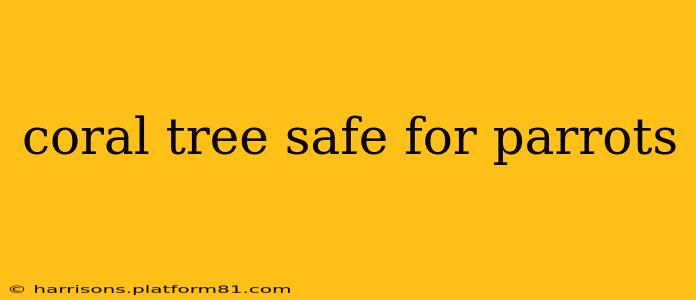The vibrant beauty of the coral tree (genus Erythrina) is undeniable, but is this striking plant safe for our feathered friends? The short answer is: no, coral trees are generally considered toxic to parrots and should not be within their reach. All parts of the plant contain toxic compounds that can cause serious health problems, even death, in parrots. This article delves into the specifics, exploring the dangers, symptoms of poisoning, and safe alternatives for enriching your parrot's environment.
What makes coral trees toxic to parrots?
Coral trees contain various toxic alkaloids, primarily erythrine alkaloids. These compounds affect the nervous system, causing a range of symptoms from mild discomfort to severe illness. The concentration of these toxins can vary depending on the species of coral tree and the part of the plant ingested. Even small amounts can be dangerous for parrots, whose smaller size makes them especially vulnerable to the effects of these toxins.
What are the symptoms of coral tree poisoning in parrots?
If your parrot has ingested any part of a coral tree, watch for these symptoms:
- Gastrointestinal distress: Vomiting, diarrhea, loss of appetite
- Neurological symptoms: Tremors, weakness, incoordination, seizures
- Respiratory problems: Difficulty breathing
- Lethargy and depression: Unusual inactivity and lack of interest in their surroundings
- Cardiovascular issues: In severe cases, heart problems can occur.
If you suspect your parrot has ingested a coral tree, seek immediate veterinary care. Timely intervention is crucial to increasing the chances of a successful outcome. Prompt treatment can significantly improve the prognosis.
What are some safe alternatives to coral trees for parrot enrichment?
Enriching your parrot's environment is crucial for their physical and mental well-being. Luckily, there are many safe and stimulating alternatives to coral trees:
- Foraging toys: These toys encourage natural behaviors and prevent boredom.
- Natural wood branches: Offer a variety of safe wood branches for chewing and climbing. Ensure they are from untreated trees and free of pesticides.
- Safe plants: Some plants are non-toxic to parrots and can add visual interest to their cage. Research thoroughly before introducing any new plant. Consider things like millet spray or certain types of grasses.
- Interactive toys: Puzzles and games can keep your parrot mentally stimulated.
Are there any coral tree species less toxic than others?
While some coral tree species might contain lower concentrations of toxins, it's crucial to avoid any contact whatsoever. The risk is simply too high, and the potential consequences are too severe to justify any level of risk. It's much safer to choose alternatives that are known to be non-toxic.
How can I prevent my parrot from accessing coral trees?
Prevention is key to ensuring your parrot's safety. If you have coral trees in your yard or garden, ensure they are completely inaccessible to your parrot. This may involve:
- Keeping your parrot indoors or in a secure aviary.
- Using bird-proof netting or barriers to block access to the trees.
- Regularly checking your yard for any fallen branches or leaves.
My parrot has touched a coral tree, should I worry?
Even if your parrot hasn't ingested any part of the plant, if it has touched a coral tree, it's best to monitor it closely for any signs of irritation or unusual behavior. Washing the affected area with clean water is a good precaution. However, if you notice any symptoms mentioned earlier, seek veterinary attention immediately.
Remember, the health and safety of your parrot are paramount. Always prioritize their well-being by avoiding potentially dangerous plants and providing a safe and enriching environment. Choosing safe alternatives will ensure a happy and healthy life for your beloved companion.
